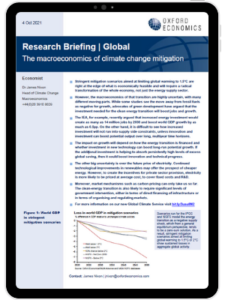The macroeconomics of climate change mitigation

Stringent mitigation scenarios aimed at limiting global warming to 1.5°C are right at the edge of what is economically feasible and will require a radical transformation of the whole economy, not just the energy supply sector.
However, the macroeconomics of that transition are highly uncertain, with many different moving parts. While some studies see the move away from fossil fuels as negative for growth, advocates of green development have argued that the investment needed for the clean energy transition will boost jobs and growth.
What you will learn:
- The impact on growth will depend on how the energy transition is financed and whether investment in new technology can boost long-run potential growth.
- The other big uncertainty is over the future price of electricity. Continued technological improvements in renewables may offer the prospect of cheaper energy.
- Moreover, market mechanisms such as carbon pricing can only take us so far. The clean-energy transition is also likely to require significant levels of government intervention.
Tags:
Related Services

Post
Food prices to bottom out in 2024, risks skewed to upside
Our baseline forecast is for world food commodity prices to register an annual decline this year, in aggregate, reducing pressure on food retail prices further downstream. However, we believe the risks to this forecast are overwhelmingly skewed to the upside.
Find Out More
Post
Battery raw material prices to recover
Battery raw materials prices bottomed out last quarter and we think a sustained recovery is looming. Midstream EV battery manufacturing activity has picked up again and inventories have returned to historical levels, suggesting upstream demand for raw materials will also bounce back.
Find Out More